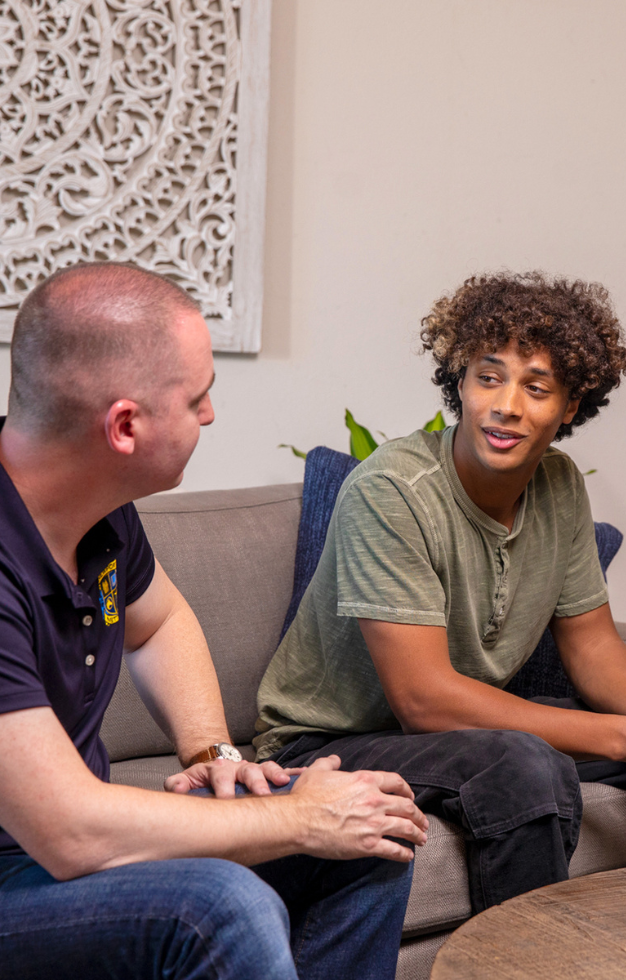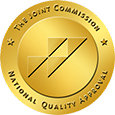Treatment Programs for Young Adult Depression
Millennials and Gen Z have experienced a dramatic rise in psychological distress and depressive symptoms, but few seek out residential programs for young adults with depression.
When unresolved depression has not been addressed, young adults cannot thrive. Maladaptive behaviors may arise due to untreated young adult depression, and they may find it difficult to carry out everyday tasks, such as completing secondary education, providing for themselves, or holding down a job.
Through our integrated approach to mental health treatment for depression, Newport Institute helps young adults ages 18–35 heal underlying trauma and attachment wounds so they can move into a bright future.
Symptoms & Causes of Depression
How do I know I’m depressed and it’s not just a phase?
Young adult depression signs and symptoms may include a change in attitude or behavior that can cause significant distress and problems at school, work, or in your personal life, such as feeling isolated or avoiding participation in social activities.
Depressive symptoms can vary in severity, but may entail a number of changes in your emotions and behavior.
The 13 most common symptoms that indicate you may be
struggling with depression:
- Feelings of sadness, which can include crying spells for no apparent reason
- Frustration or feelings of anger, even over small matters
- Feeling hopeless or emptiness
- Irritable or annoyed mood
- Loss of interest or pleasure in usual activities
- Conflict with or withdrawal from family and friends
- Low self-esteem
- Feelings of worthlessness or guilt
- Fixation on past failures or exaggerated self-blame or self-criticism
- Extreme sensitivity to rejection or failure, and the need for excessive reassurance
- Trouble thinking, concentrating, making decisions and remembering things
- Ongoing sense that life and the future are grim and bleak
- Suicide ideation: frequent thoughts of death, dying or suicide
Know the Facts
Between 2008 and 2017, suicides among young adults ages 18 and 25 grew 56 percent. Suicidal ideation rose by 68 percent. In that same time frame, suicide attempts rose 87 percent among 20- and 21-year-olds and 108 percent among 22- and 23-year-olds.
Do I have depression?
It can be difficult to tell the difference between the usual ups and downs of life and depression in young adults. The most important thing is to realize that you’re not alone and to speak with someone you trust. If life feels overwhelming and you feel incapable of managing emotions or behaviors in conjunction with one or more of the symptoms outlined, don’t be afraid to reach out to an expert at a program for young adults with depression.
What causes
depression?
Depression can be caused by a myriad of issues. These include:
Early childhood trauma
Traumatic events during childhood, such as physical or emotional abuse or loss of a parent, may cause changes in the brain that make a person more susceptible to depression.
Brain chemistry
Neurotransmitters are naturally occurring brain chemicals that carry signals to other parts of your brain and body. When these chemicals are impaired or out of balance, the function of nerve receptors and nerve systems changes, leading to depression.
Learned patterns of negative thinking
Depression in young adults may be linked to learning to feel helpless and lost, rather than learning that you have the ability to find solutions for life's challenges.
Hormones
Changes in the body's balance of hormones may be involved in causing or triggering depression.
Inherited traits
Depression is more common in people whose blood relatives—such as a parent or grandparent—also have the condition.
Our residential programs for young adults with depression are designed to help young people find their voice, accept constructive feedback, and develop self-esteem and self-acceptance.
Depression and Substance Abuse
Untreated depression in young adults can result in emotional, behavioral, and health problems that may impact all facets of their life. Complications related to young adult depression may include any of the following:
- Substance use disorder
- Disordered eating
- Alcohol and drug misuse
- Academic or problems at work
- Family conflicts and relationship difficulties
- Suicide attempts or suicide.
Diagnosis & Treatment for Young Adult Depression:
What are the first steps?
When depressive symptoms are suspected, a medical care provider will typically conduct the following exams and tests to inform a comprehensive diagnosis:
- Physical exam. The doctor may do a physical exam and ask in-depth questions about your health to determine what may be causing depression. In some cases, depression may be linked to an underlying physical health problem.
- Lab tests. For example, a doctor may conduct a blood test called a complete blood count, or test your thyroid to ensure that it’s functioning properly.
- Psychological evaluation. A doctor or mental health professional may inquire about your thoughts, feelings and behavior, or give you a questionnaire to fill out. Your answers help pinpoint a diagnosis and a check for related complications or other co-occurring symptoms. The next step is to research outpatient or residential programs for young adults with depression.
Types of Depression
can rise in bouts that can last for at least two weeks. Major depressive disorder deeply affects the quality of life and health of an individual. Persistent depressive disorder is a mild to moderate form of depression that reduces functioning.
is a subtype of major depression. It leads to extreme irritability and excessive worrying. Some symptoms include waking very early in a negative state of mind or an inability to get back to sleep.
is most often triggered in winter due to lack of sunlight. The end of summer when school is about to begin can trigger it as well. Some adolescents experience depressive symptoms at the same time each year, almost like clockwork.
has several specific symptoms. These symptoms include increased appetite/weight gain, excessive sleep, and marked fatigue. They also can include emotional overreactions, and an extreme sensitivity to rejection.
is a type of depression characterized by unusual restlessness and worry about possible events or loss of control.
When should I see a doctor or consider a residential program for young adults with depression?
If depression signs and symptoms continue, begin to interfere in your life or the life of someone you care about, or cause you to have concerns about suicide or an individual’s safety, talk to a doctor or a mental health professional. Your family doctor may be a good place to start.
Symptoms of severe depression in young adults likely won’t get better on their own—and they may worsen or lead to other problems if untreated. Depression creates a risk of suicide, even if the signs of young adult depression don’t appear to be severe.
If you think you may be depressed—or you have a friend or loved one who may be depressed—don’t wait to get help. Talk to a healthcare provider such as your doctor, an urgent care provider, or a psychiatrist. Share your concerns with a parent, family member, close friend, spiritual leader, teacher, mentor, or someone else you trust.
When to Get Emergency Help
Suicide is often associated with depression. If you think you or someone whom you care about may hurt themselves or attempt suicide, call 911 or your local emergency number immediately. Or call a suicide hotline. In the United States, call the National Suicide Prevention Lifeline at 988 or use its webchat at suicidepreventionlifeline.org/chat.
If a loved one or friend is in danger of attempting suicide or has made an attempt:
- Make sure someone stays with that person.
- Call 911 or your local emergency number immediately.
- Or, if you can do so safely, take the person to the nearest hospital emergency room.
- Never ignore comments or concerns about suicide. Always take action to get help.
By most estimates, between 5 and 10 percent of the US population experiences SAD. But only a small portion of Americans, somewhere around 1 percent of the total population, have flare-ups in the summertime.

Questions?
All calls are always confidential.
Care at Newport Institute


Our Philosophy
At Newport Institute, we recognize that young adults who end up in treatment are not broken or bad or wrong. Often, there has been some form of childhood trauma—whether that’s acute trauma, relational trauma, or long-term addiction. When a young person experiences these types of traumas, they begin to develop insecure attachment models, which can eventually lead to depression or anxiety, and manifest as maladaptive coping mechanisms.
At our program for young adults with depression, we recognize and honor these young people for who they are—beautiful, bright, intelligent people; bright spirits that have somehow had their light dimmed. We help them peel back the layers of trauma and coping mechanisms, and take down the barriers they’ve put up between themselves and the world, through a holistic, integrated approach to treatment.
Joe Procopio
Newport Healthcare CEO
Clinical
Our comprehensive approach offers a different kind of mental health treatment that incorporates leading modalities in therapeutic offerings.
- Individual Therapy
- Family Therapy
- Group Therapy
- Psychiatry
- Medical Care
- Attachment-Based Family Therapy
- CBT
- Emotional Freedom
- Person-Centered or Humanistic Therapy
- Dialectical Behavioral Therapy
- Acceptance Commitment Therapy
- Eye Movement Desensitization and Reprocessing
- Post-Induction Therapy
- Individual Therapy
- Emotional Freedom
- Family Therapy
- Person-Centered or Humanistic Therapy
- Psychiatry
- Dialectical Behavioral Therapy
- Medical Care
- Acceptance Commitment Therapy
- Attachment-Based Family Therapy
- Eye Movement Desensitization and Reprocessing
- CBT
- Post-Induction Therapy
- Individual Therapy
- Family Therapy
- Group Therapy
- Psychiatry
- Medical Care
- Attachment-Based Family Therapy
- CBT
- Emotional Freedom
- Person-Centered or Humanistic Therapy
- Dialectical Behavioral Therapy
- Acceptance Commitment Therapy
- Eye Movement Desensitization and Reprocessing
- Post-Induction Therapy
Experiential
Rather than using a one-size-fits-all treatment plan, we treat each individual and their support system as unique. Our tailored approach may integrate any of the following experiential therapies:
- Yoga
- Music Therapy
- Martial Arts Group
- Photography Arts
- Equine-Assisted Therapy
- Adventure Therapy
- Culinary Arts
- Art Therapy
- Fitness Activity
- Horticulture
- Community Service
- Life Skills Training
- Mindfulness/Meditation
- Yoga
- Culinary Arts
- Music Therapy
- Art Therapy
- Martial Arts Group
- Fitness Activity
- Photography Arts
- Horticulture
- Equine-Assisted Therapy
- Community Service
- Adventure Therapy
- Mindfulness/Meditation
- Yoga
- Music Therapy
- Martial Arts Group
- Photography Arts
- Equine-Assisted Therapy
- Adventure Therapy
- Culinary Arts
- Art Therapy
- Fitness Activity
- Horticulture
- Community Service
- Life Skills Training
- Mindfulness/Meditation

A child’s biology and psychology create their overall temperament, which determines how they take in and process the world. Some kids and teens are more sensitive, and if they’re unable to find healthy coping mechanisms to help them handle these intense feelings and reactions, they may spiral into depression, anxiety, or other condition.
Barbara Nosal, PhD, LMFT, LADC
Chief Clinical Officer
Medical and Clinical Teams
At Newport Institute’s programs for young adults with depression, our staff’s clinical expertise is matched only by their compassion and desire to see lives changed. Our team of psychiatrists, family therapists, nurse practitioners, counselors, equine therapists, art therapists, music therapists, adventure therapists, registered dietitians, nutritionists, mentors, and private tutors embrace their practice with an unconditional love that supports clients’ self-worth and self-acceptance as they do the work of healing. Each client has a treatment team that creates a tailored treatment plan for addressing their depression.
Newport Healthcare also provides evidence-based treatment for teens with depression, through our Newport Academy residential and outpatient programs for ages 12–18. Find out more.
Marks of Quality Care
Our innovative approach to mental healthcare earns accolades from press around the world, but it is our dedication to our client success that has helped us achieve accreditation from The Joint Commission, exceed licensing standards of care, and nurture affiliations with the following:
Frequently Asked Questions About Young Adult Depression
What does depression in young adults look like?
Symptoms of depression in young adults can vary widely, from sadness and suicidal thoughts to behavioral symptoms like substance abuse, eating disorders, and anger or aggression. An assessment with a mental health professional can help young adults with depression determine what type of depression they’re suffering from and the best treatment option for their mental health disorder.
Why is depression so common in young adults?
Young adults are facing a myriad of external and internal stressors, including the negative impact of social media overuse, political upheaval, and fears around climate change. Moreover, the repercussions of the pandemic continue to impact young adults’ mental health, executive functioning, and social connections, causing increasing rates of mental illnesses.
What is the most effective way to treat adolescent and young adult depression?
Residential programs for young adults with depression are proven to result in effective healing and long-term recovery. The immersive approach of young adult depression programs like Newport Institute’s addresses every aspect of a young adult’s well-being.
What can untreated depression turn into?
If depression in young adults is not treated, symptoms can become severe and debilitating, preventing everyday functioning and disrupting work, school, and relationships. Moreover, depression can lead to suicidal thoughts and suicide attempts. It is essential that young adults with depression receive treatment in a mental health program.
What are 5 signs of depression for a young person?
Five signs of young adult depression are feelings of sadness, inability to enjoy activities they used to find pleasurable, suicidal thoughts, difficulty sleeping, and self-medication with drugs and/or alcohol.




